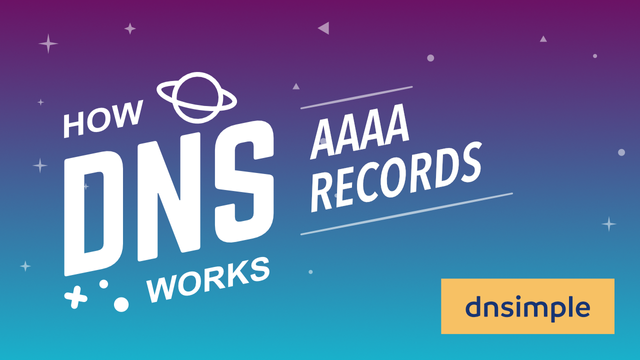Recent searches
Search options
#ipv6
Bummer. fosstodon.org's host doesn't support #IPv6
I'm AFK, but I just saw that my monitoring lit up yesterday evening for AAAA records for MX targets on Exchange Online — looks like Microsoft finally dropped the hammer on the change they started last October. #IPv6
Hello le #fediverse ! J'envisage peut-être de passer mes instances #peertube, #friendica, #pixelfed et #mastodon vers des serveurs full #ipv6 (des tests sont en cours avec pixelfed), ce qui me permettrait d'avoir une ip publique différente par machine, ce qui n'est pas le cas avec #ipv4, tous mes services tournent sur une même machine (ça fonctionne mais ce n'est pas très safe). Êtes-vous prêts pour le 100 % #ipv6 ? Vos réponses m'aideront à prendre une décision
Dive into the world of DNS with our latest video!
Just released: "What are AAAA Records?" If you're looking to expand the connections your web service or app has with IPv6, this video will teach you how AAAA Records map your domain to IPv6 addresses so that you can take advantage of the emerging technology.
https://youtu.be/4SGgO5MSQLg
Question to the network people out there:
Are there any ISPs that are IPv6 only (without providing a NAT/whatever)?
Background: Having an argument with a provider that hasn't published any AAAA records, and whilst I think that's poor form, I'm wondering if this would actually negatively affect any actual users in practice?
Český #T-Mobile by měl od zítřka (1. dubna) začít plošně nasazovat #IPv6 na mobilní síti! Nové SIM ji dostanou hned, starší uživatelé budou muset počkat, až na ně přijde řada. Takže zapněte v nastavení APN podporu dual-stacku a testujte.
T-Mobile je poslední český mobilní operátor, který IPv6 zatím neumí. To se během pár dnů snad změní a budeme plně mobilně IPv6-ready.
Podle Google máme dnes asi 31% penetraci IPv6 u koncových uživatelů. Tohle by s tím mohlo zase pohnout nahoru.
@DoctorBrodsky @woe2you @miah given #Quad9 bowed before the #Contentmafia and censored #DNS requests, I'll continue to recommend using #OpenNIC's Servers instead
94.103.153.176 & 2a02:990:219:1:ba:1337:cafe:3 as well as144.76.103.143 & 2a01:4f8:192:43a5::2
- If you only add a single #IPv4 address, no #IPv6 resolution will take place over said provider or worse even no IPv6 connectivity at all...
I merely retain quad9 on said list for archival purposes. I Yeeted #CloudFlare aka. #ClownFlare since they are a #RogueISP!

Set #IPv6 #DNS records for my #cloud #kubernetes ingress seconds before this happened. Hooking stuff up to the publc internet is pretty wild
@oliverwiegers it doesn't support #ipv6, unfortunately
A long-standing Linux headache for large-scale #IPv6 deployments was that net.ipv6.route.max_size was set to 4096 and had to be raised manually.
It looks like recent kernels raised this in this commit (which also seems to be what is included in Ubuntu 24.04):
https://github.com/torvalds/linux/commit/af6d10345ca76670c1b7c37799f0d5576ccef277
[...]
- net->ipv6.sysctl.ip6_rt_max_size = 4096;
+ net->ipv6.sysctl.ip6_rt_max_size = INT_MAX;
If you are using IPv6 for large scale production services don't forget to either raise this sysctl manually or use a newer kernel that raises it.
I do that with #pfSense & #OPNsense (depending on the exact network in question) and have it merge multiple sources that get cached.
In total, I do may out the 30 DNS servers and whilst I have #IPv4only, I have everything ready for #DualStack (#IPv4 + #IPv6) once my ISP stops keeing it's thumbs um their ass...
This week I will be replacing my router (#Ubiquiti #Edgerouter Lite) with an Alta Labs #Route10. The ERL has been great, but there is one specific condition which causes severe performance issues. The ERL can offload #ipv6, #vlan and #pppoe at 1gbs, but not all at once. So, if you try to transfer a lot of ipv6 traffic, it drops to software and it then affects all traffic passing through. The main "culprit" is Steam which prefers ipv6 (as it should!) The new router should not have that limitation.
Anyone know why opening #IPv6 ports on #GoogleWifi might be failing for me? I have IPv6 service from my ISP (sonic.net - they're awesome!) and have a web server set up on my #RaspberryPi.
Requests from outside my network sent to the pi's IPv6 GUA keep failing, even though I have ports 80 and 443 open for the pi in the "Port Management" section of the google home app. Requests made to that same IPv6 GUA work fine within my network.
(I also have IPv4 port forwarding set up on that same page, and that seems to work fine to forward requests made to my router's external IPv4 address to the pi, so I could simply not set up an AAAA record and move forward with only IPv4 access to my server, but I'd prefer having a working dual-stack setup!)




![A screenshot of a web browser attempting to make a connection to a website using the address https://2a04:4e42::820
The error message is as follows:
Requested host does not match any Subject Alternative Names (SANs) on TLS certificate
[afde811d2be66338F3f f6da60e6b92fc301cc816eb27d3b05a2b323b892c3fF] in use with this connection.
Visit https: //ww.fastly.com/documentation/guides/concepts/errors/#routing-errors for more information. A screenshot of a web browser attempting to make a connection to a website using the address https://2a04:4e42::820
The error message is as follows:
Requested host does not match any Subject Alternative Names (SANs) on TLS certificate
[afde811d2be66338F3f f6da60e6b92fc301cc816eb27d3b05a2b323b892c3fF] in use with this connection.
Visit https: //ww.fastly.com/documentation/guides/concepts/errors/#routing-errors for more information.](https://cdn.bolha.us/bolhaprod/cache/media_attachments/files/114/287/228/290/854/615/small/3a597c26d70842b6.png)







